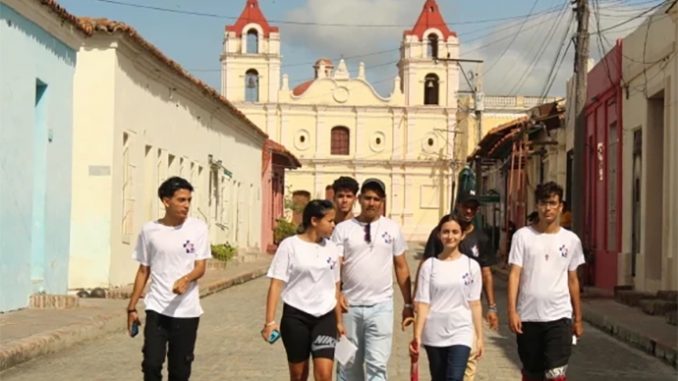
ACI Prensa Staff, Aug 20, 2025 / 07:00 am (CNA).
During the Jubilee of Youth in Rome, young people from around the world gathered to celebrate a mosaic of universal faith. In the midst of this gathering, an inevitable question arose for young Cubans: How can they live their faith in a country fraught with challenges?
ACI Prensa, CNA’s Spanish-language news partner, spoke with Fernando Mario Díaz Hernández and Cynthia Izaguirre Roldán, both 19 and university students whose lives bear witness to a Catholic faith that steadfastly perseveres in everyday life despite the precarious conditions.
They live in Camagüey, a province located in the heart of Cuba, between the Atlantic and the Caribbean. According to the website Catholic Hierarchy, the Archdiocese of Camagüey has 15 parishes and 26 priests for approximately 800,000 inhabitants. Nationally, Aid to the Church in Need estimates that there are only 370 priests in the 11 dioceses.
Spiritual challenges
Hernández indicated that the large number of churches in his city is a factor that makes the Catholic faith present in the daily life of society. However, he contrasted this impression, noting that despite this, “being a young Catholic is difficult.”
Izaguirre agreed, adding that “there is a lack of priests” and “consistency in the faith, so that young people live their lives according to their convictions, not otherwise.”
Father Alberto Reyes Pías from St. Joseph Parish in Esmeralda has a vision that is not very different from that of the young people. The priest noted that there is a need to “find a path that leads them to a spiritual experience, to an encounter with a transcendent dimension.”

Reyes emphasized that today they face the challenge of “choosing the values of the spirit in a world where those values are viewed with indifference or even as disadvantages for progressing in life.”
In this regard, he emphasized that it’s a real challenge for young people “to get to the point where life has a meaning beyond the daily demands of survival.” The priest considers that the main task of the new generations is “not to lose hope that a different homeland is possible, in the midst of an environment of survival, precariousness, and lack of horizons.”
The priest also warned about “an accelerated rise in Afro-Cuban religions,” which offer “an illusion of security and control over life, which in Cuba today is a very complicated issue, because you never know what will happen on a given day, much less in the long term.” He also emphasized that these religions “make no claims on moral behavior, which makes it easy and convenient to ‘get hooked’ on them.”
Other challenges for youth
The challenge is not only spiritual. According to figures from Human Rights Watch (HRW), Cuba’s population decreased by 10% between December 2021 and December 2023, primarily due to migration. Between January and August 2024 alone, the United States Border Patrol apprehended Cubans more than 97,000 times, which may include multiple encounters with the same persons.
Furthermore, the report describes an “economic crisis” that has caused power outages of up to 20 hours a day in some areas, along with “acute shortages of food, medicine, and other essential items.” According to HRW, in February, the government requested assistance from the United Nations World Food Program for the first time to obtain powdered milk for children under 7 years of age.
The same report warns that Cubans who criticize the government “risk criminal prosecution” without being guaranteed due process. In practice, “the courts are subordinate to the executive branch.” Furthermore, the state “controls virtually all media.”
Signs of hope
Amid precarious conditions, faith remains a source of hope. Izaguirre said that “through my faith and that of many others, we can aspire to a better future” and she dreams of “a country free from the shackles that limit us, where we can hold processions and Stations of the Cross with the hope that they won’t tell us ‘you can’t.’”

She noted that one of the things that inspires her is that, despite everything, hope “still persists in those who seek and find purpose in faith, as well as in those who fight daily for change in our country, despite the oppression and what this can mean.”
Far from being discouraged, Izaguirre is committed to “creating spaces for debate and activities that demonstrate that faith is still alive in Cuba. There are still young people willing to fight for change and keep that spark of hope alive in our homes.”
For his part, Hernández confessed that, although at times it’s difficult for him to “maintain hope,” his faith has saved him. “When I feel like I can’t go on, that it’s impossible to continue, I go before the Lord, and he comforts me, fills me with encouragement and strength to endure.”
That’s why he actively participates in youth ministry, so that, together with other young people, he can create “a space where they can receive formation, feel safe, and recover that source of energy that drives their lives, always for the greater glory of God.”
Reyes shared that he has noticed an increase in children who “grow up without fear of openly acknowledging their faith. Many children go to church alone, without their parents taking them,” and it’s the example of many children “that their parents have started attending church.”
The priest noted that, despite the emigration of young people, communities are “being renewed by young people who keep coming and who ask to undergo a process of growing in faith, and the change in their lives is a source of hope, seeing in them that beautiful reality we call ‘conversion.’”
Reyes also noted that in his experience, “couples are increasingly requesting the sacrament of marriage, and more and more people are baptizing their children, even if they don’t attend church.”
Catechumenate groups have also increased, and despite constant emigration, “communities are renewing themselves.”
This story was first published by ACI Prensa, CNA’s Spanish-language news partner. It has been translated and adapted by CNA.
If you value the news and views Catholic World Report provides, please consider donating to support our efforts. Your contribution will help us continue to make CWR available to all readers worldwide for free, without a subscription. Thank you for your generosity!
Click here for more information on donating to CWR. Click here to sign up for our newsletter.












